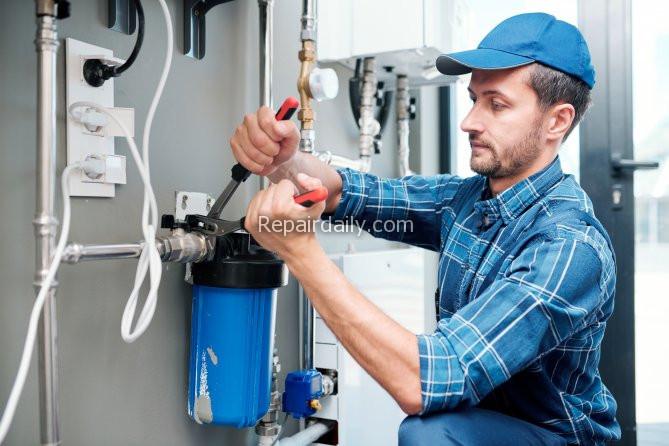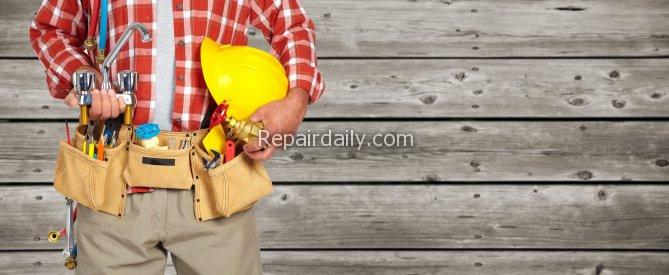

plumber working on plumbing
To be labeled ‘master’ entails the person has gained all the education, training, and experience to excel and lead in their respective field.
For instance, a master plumber must have taken a state licensure exam and obtained a license. Prior to taking the exam, the state must have ascertained that the master plumber’s skills and experience, as well as other qualifications, exceed that of a journeyman plumber.
If you’re interested in starting your career as a plumber, check out this definitive guide on how to set your journey towards becoming a master plumber.
Why Pursue A Career In Plumbing
Plumbing is perhaps one of the most underrated trades in the world. When a household experiences water leaks, homeowners tend to fix the issue on their own, not knowing the implications of this decision. While minor fixes can be done as a temporary solution, more people need to be aware that water system problems need professional services to prevent more serious problems down the road.
According to the Bureau of Labor and Statistics (BLS), the plumbing sector is projected to grow at an average rate of 4% from 2019 to 2029, which is similar to the overall employment growth figures. It’s estimated that an entry-level plumber can earn up to USD$56,300 annually, while a master plumber can earn an average of USD$80,000 for the same period.
Apart from the promise of relatively high earnings, being a plumber can provide you with self-fulfillment knowing that you’re able to help distressed families by fixing their problems.
What Does A Plumber Do?
Being a plumber takes more than stopping leaks and fixing drains. They can also teach homeowners how to avoid the most common plumbing mistakes. To practice the craft, one has to have a good understanding of the structures and components needed to keep water flowing smoothly in simple water systems at home and in more complex systems in cities, villages, and other commercial settings.
They’re trained professionals who install and repair water, gas, and other piping systems in residential and commercial settings. They also install and repair plumbing fixtures, including toilets, water heaters, and dishwashers. Additionally, plumbers can maintain septic systems.
The good thing about plumbers is that they can practice their craft wherever they may be. However, as state plumbing license requirements vary, you may need to take an additional short course and state licensure examination to practice in another state.
What Does A Master Plumber Do?
Master plumbers are experts who read blueprints and use various tools to install, maintain, and repair residential and commercial water systems. Commonly found fixing the kitchen and bathroom, master plumbers also work on drainage, gas, and waste systems. However, being advanced-level professionals, only master plumbers can plan out water service systems and sketch blueprints.
Most master plumbers have their own private plumbing firm. On some occasions, they can work for building contractors and government agencies.

plumber with plumbing tools
Qualifications To Become A Master Plumber
Being a master plumber requires expertise developed through years of hands-on experience, training, and education.
1. Education Requirements
To kick off their career, a plumber can start an apprenticeship job upon reaching 18 years old. The apprenticeship screening committee may require a high school diploma or its equivalent. For programs accredited by the U.S. Department of Labor, a high school diploma is required, given that an applicant can earn credit from community colleges.
Alternatively, a plumber may opt to take a certificate program or an associate degree program in plumbing and heating, plumbing technology, or a related field.
2. Apprenticeship
Anyone who wants to become a master plumber has to start by becoming an apprentice. This stage can take up to five years to finish. Plumbing apprentice workers are paid while they’re working with a journeyman or master plumber. Moreover, an apprentice should finish at least 2,000 on-the-job hours and about 250 hours in classroom lectures.
Lectures may include drafting and blueprint reading, mathematics, applied physics and chemistry, workplace safety, and local plumbing codes and regulations. Practical lessons include identifying tools and materials, performing installation and maintenance works, and repairing water pipes.
3. Experience As A Journeyman Plumber
After completing an apprenticeship, an aspiring master plumber must then gain work experience and pass a state-administered journeyman plumber licensure exam. It’s also important to remember that not all states require this particular license; you may be asked to take a different licensure exam. At this stage, you can already work on your own.
As a journeyman plumber, you need to renew your license regularly. Again, states have different renewal requirements and duration. Some jurisdictions require yearly renewals, while other states provide licenses valid for three to five years.
Despite the varying licensing requirements from state to state, there are a few common items you’ll be asked to prepare. So, before you can practice your trade, make sure you satisfy the following requirements:
- Proof of completion of an accredited program
- Liability insurance
- Certificate of insurance
- Workers’ compensation coverage
- Specific years of experience
- Other pre-examination requirements
Most states require a special license for pipefitters and steamfitters.
4. Additional Skills, Experience, And License
Before qualifying for a master plumber licensure examination, an aspirant must’ve worked as a journeyman plumber for at least two consecutive years.
To test the skills, knowledge, and experience of a would-be master plumber, they must take an exam with both written and practical sections. Once you pass this test, you’ll be recognized as a master plumber and can start practicing as one.
To be a successful plumber, an individual should develop the following skills essential to the job:
- Communication skills
- Good listening skills
- Analytical skills
- Dexterity
- Mechanical skills
- Physical strength
- Troubleshooting skills
Final Thoughts
Being a master plumber can be a lucrative career. As a state-recognized master plumber, you can practice anywhere and even open your own business, taking on new plumbing apprentice workers.
Some jurisdictions may require continuing education for master plumbers for specialized lectures on new codes and regulations.
Most states offer different licensing types for plumbers depending on their current professional level. Before practicing your trade, find out the licensing requirements so you won’t get into trouble.
